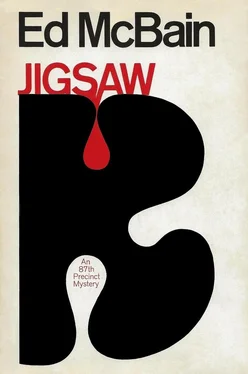“Have you ever been backstage at the Folies Bergère?” Hawes whispered back.
“No, but I’m sure it’s just like this.”
“Better,” Hawes said.
“Have you ever been?”
“Never.”
“Well, here I am, back again,” Suzie said, and smiled, and tossed her long blond hair and added, “I think they were a bit too snug, don’t you?”
“What’s that?” Meyer said.
“The pants she had on.”
“Oh, sure, a little too snug,” Meyer said. “Miss Endicott, about the night Weinberg was killed...”
“Oh, yes, that was just dreadful, wasn’t it?” Suzie said.
“Yes, it was,” Hawes said gently and tenderly.
“Although I understand he was a criminal. Weinberg, I mean.”
“Who told you that?”
“Irving did. Was he a criminal?”
“He paid his debt to society,” Hawes said tenderly and gently.
“Oh, yes, I suppose he did,” Suzie answered. “But still.”
“In any event,” Meyer said, passing a hand over his bald pate and rolling his china-blue eyes, “he was killed, and we’re conducting an investigation into his murder, and we’d like very much to ask you some questions about that night, if it’s not too much trouble, Miss Endicott.”
“Oh, it’s no trouble at all,” Suzie said. “Would you please excuse me for just one teeny minute?” she said, and went over to the cash register where a leggy redhead was standing with several sweaters in her arms, waiting to pay for them.
“We’ll never get out of this joint,” Meyer said.
“That wouldn’t be too bad,” Hawes said.
“For you, maybe it wouldn’t be too bad. For me, if I don’t get home in time for dinner, Sarah’ll kill me.”
“Why don’t you run on along then?” Hawes said, and grinned. “I think I can handle this alone.”
“Oh, I’m sure you can,” Meyer said. “Trouble is, you see, we’re supposed to find out who killed Weinberg. That’s the trouble, you see.”
“Well, here I am back again,” Suzie said, and smiled, and tossed her long blond hair. “I’ve asked Michelle to spell me, so I don’t think we’ll be interrupted again.”
“That’s very kind of you, Suzie,” Hawes said.
“Oh, not at all,” she answered, and smiled again.
“About that night...”
“Yes,” she said, alert, and responsive, and eager to cooperate. “What would you like to know?”
“First, what time did you get to Irving Krutch’s apartment?”
“It must have been about seven-thirty,” Suzie said.
“How long have you known Mr. Krutch?” Hawes said.
“We’ve practically been living together for four years,” Suzie answered, her big brown eyes opened wide.
“Oh,” Hawes said.
“Yes.”
“I see.”
“We have separate apartments, of course.”
“Of course.”
Meyer cleared his throat. “What... uh... what was I saying?” he said, turning to Hawes.
“Time she got there,” Hawes said.
“Oh yes. Seven-thirty, is that right?”
“That’s right,” Suzie said.
“And what did you do when you got there?”
“Irving gave me a martini. Two martinis, in fact. I love martinis. Don’t you just adore martinis?” she asked Hawes.
“Mmm,” Hawes said.
“Were there any visitors while you were there?”
“None.”
“Any phone calls?”
“Yes.”
“Would you happen to know from whom?”
“From a detective. Irving seemed very happy when he hung up.”
“Are you engaged or something?” Hawes asked. “Is that it?”
“To be married, do you mean?”
“Yes, to be married.”
“Oh, no, don’t be silly,” Suzie said.
Meyer cleared his throat again. “What time did you leave the apartment?” he asked.
“About eight-thirty. I think it was eight-thirty. It could have been a teeny bit earlier or a teeny bit later. But I think it was around eight-thirty.”
“And where did you go?”
“To The Ram’s Head.” She smiled up at Hawes. “That’s a restaurant. Have you ever been there?”
“No. No, I haven’t.”
“It’s very nice.”
“What time did you leave the restaurant, Miss Endicott?”
“About ten-thirty. Again, as I said, it might have been a teeny bit...”
“Yes, but it was around ten-thirty.”
“Yes.”
“And then what did you do?”
“We went for a walk on Hall Avenue, and looked in all the store windows. We saw some marvelous lounging pajamas in Kilkenny’s. Italian, I think they were. Just, oh so colorful.”
“How long did you walk on Hall Avenue?”
“An hour or so? I guess it was an hour or so.”
“And then what did you do?”
“We went back to Irving’s apartment. What we do, you see, is we either go to Irving’s apartment or to my apartment. I live downtown in The Quarter,” she said, looking up at Hawes. “Do you know Chelsea Street?”
“Yes, I do,” Hawes said.
“121/2 Chelsea Street,” she said, “apartment 6B. That’s because of hard luck.”
“What is?”
“The 12 1/2. It should be 13, but the owner of the building is superstitious.”
“Yes, there are lots of buildings in the city like that,” Hawes said.
“Lots of buildings don’t even have a thirteenth floor ,” Suzie said. “That is, they have a thirteenth floor, but it’s called the fourteenth floor.”
“Yes, I know.”
“12 1/2 Chelsea Street,” she said, “apartment 6B, Hampton 4-8100.” She paused. “That’s my telephone number.”
“So you went back to Mr. Krutch’s apartment at about eleven-thirty,” Meyer said, “and then what did you do?”
“We watched television for a while. Buddy Hackett was on. He’s a scream. Don’t you just adore Buddy Hackett?” she said, looking up at Hawes.
“I adore him, yes,” Hawes said, and Meyer gave him a peculiar look. “He’s very comical,” Hawes said, ignoring the look.
“He’s just adorable,” Suzie said.
“What did you do after watching television?” Meyer said.
“We made love,” Suzie said.
Meyer cleared his throat.
“Twice,” Suzie added.
Meyer cleared his throat again.
“Then we went to sleep,” she said, “and in the middle of the night this Italian detective knocked on the door and started asking all sorts of questions about where we were and what we were doing. Is he allowed to do something like that, come around in the middle of the night, and bang on the door, and ask dumb questions?”
“Yes, he is,” Hawes said.
“I think that’s awful,” Suzie said. “Don’t you think that’s awful?” she asked Hawes.
“Well, it’s a job,” Hawes said, and smiled weakly, and tried to avoid Meyer’s glance again.
“Did either of you leave the apartment at any time between eleven-thirty and three A.M.?” Meyer asked.
“Oh, no. I told you. First we watched television, and then we made love, and then we went to sleep.”
“You were there all the time?”
“Yes.”
“Both of you.”
“Yes.”
“Mr. Krutch didn’t leave the apartment at all.”
“No.”
“If you were asleep, how do you know whether he left or not?”
“Well, we didn’t go to sleep until about maybe two o’clock. Things take time, you know.”
“You were awake until two A.M.?”
“Yes.”
“And Mr. Krutch did not leave the apartment?”
“No.”
“Did he leave the bedroom?”
“No.”
“Not at any time during the night?”
“Not at any time during the night.”
“Okay,” Meyer said. “You got anything else, Cotton?”
Читать дальше









